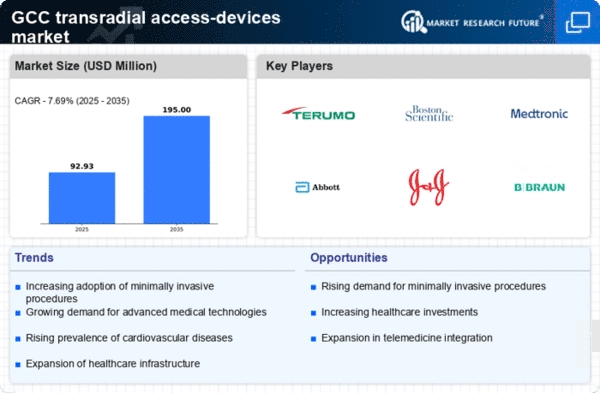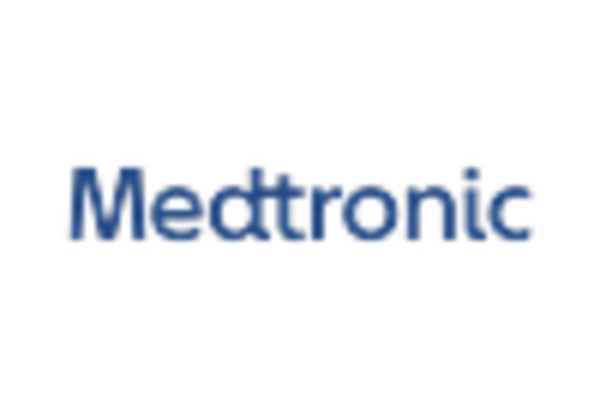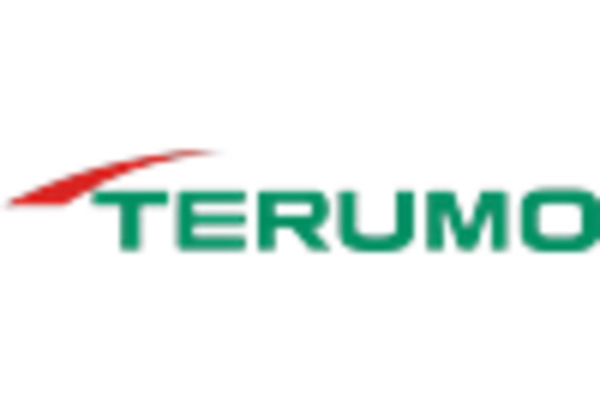Surge in Healthcare Expenditure
The GCC countries are witnessing a surge in healthcare expenditure, which is anticipated to positively impact the transradial access-devices market. Governments in the region are increasing their healthcare budgets, with some countries allocating over 10% of their GDP to health services. This financial commitment is likely to facilitate the procurement of advanced medical devices, including transradial access devices. As healthcare facilities upgrade their infrastructure and technology, the demand for innovative access solutions is expected to rise. This trend indicates a favorable environment for manufacturers and suppliers in the transradial access-devices market, as they can capitalize on the growing investments in healthcare.
Supportive Regulatory Environment
The regulatory environment in the GCC is becoming increasingly supportive of the transradial access-devices market. Regulatory bodies are streamlining the approval processes for medical devices, which encourages innovation and market entry for new products. This supportive framework is likely to foster competition among manufacturers, leading to improved product offerings and lower prices for healthcare providers. As a result, hospitals and clinics may be more inclined to adopt transradial access devices, contributing to market growth. The proactive stance of regulatory agencies in promoting advanced medical technologies is expected to play a crucial role in shaping the future of the transradial access-devices market.
Rising Awareness of Patient Safety
There is a growing awareness of patient safety and the benefits of minimally invasive procedures among healthcare professionals and patients in the GCC. This awareness is driving the adoption of transradial access devices, which are known for their safety profile and reduced risk of complications compared to traditional access methods. Studies indicate that transradial access can lower the incidence of bleeding complications by up to 30%, making it an attractive option for both patients and healthcare providers. As hospitals prioritize patient safety and quality of care, the transradial access-devices market is likely to expand, reflecting the shift towards safer medical practices.
Technological Innovations in Medical Devices
Technological innovations in medical devices are significantly influencing the transradial access-devices market. The introduction of advanced materials and designs has enhanced the performance and usability of these devices. For instance, the development of ultra-thin catheters and improved hemostatic devices has made transradial access procedures more efficient and effective. As healthcare providers in the GCC increasingly adopt these innovations, the market for transradial access devices is expected to grow. Furthermore, ongoing research and development efforts are likely to yield new products that meet the evolving needs of clinicians and patients, further driving market expansion.
Increasing Prevalence of Cardiovascular Diseases
The rising incidence of cardiovascular diseases in the GCC region is a primary driver for the transradial access-devices market. As healthcare providers seek effective solutions for diagnosis and treatment, the demand for transradial access devices is likely to increase. According to recent data, cardiovascular diseases account for approximately 40% of all deaths in the GCC, highlighting the urgent need for advanced medical interventions. This trend suggests that healthcare systems are prioritizing the adoption of transradial access techniques, which are associated with lower complication rates and faster recovery times. Consequently, the transradial access-devices market is expected to experience substantial growth as hospitals and clinics invest in these technologies to enhance patient outcomes.
















